
In the workshop where we talk over the outcomes of the CSO-Academy Cooperation Support Program which we carry out to strengthen the relationship between civil society organizations and academy in Turkey, and how to improve the relations between academy and civil society, attendant academicians and CSO representatives underlined that to strengthen the bonds between academy and civil society, this kind of work practices are crucial and need to be improved.
At the opening of the workshop we organized online on December 8, 2020, STGM General Coordinator Tezcan Eralap Abay explained that the CSO-Academy Cooperation Program was implemented by taking into account the needs in the civil field and civil society organizations and academia must work together to create social transformation.
Everyone Has The Responsibility For Working Together
Abay while saying that academia in Turkey has a serious source and knowledge, stated that there are problems in penetration of knowledge produced in academy to civil society and implementation of the knowledge by civil society. Abay telling that CSO-Academy Cooperation Program is designed to overcome this lack, stated everyone has the responsibility to improve practices of collaborated work.
CSO Resource Center Project Coordinator Öyküm Bağcı stated that STGM's work under this topic is fed by this responsibility, and said that they aim to make the works produced in the academy accessible to organizations. Bağcı also gave information about the Civil Society School (STOK) and the Academic / Researcher Database, which STGM has established to support the togetherness between academia and civil society.
Bağcı also shared data from the CSO-Academy Collaboration Program. Bağcı explaining that 27 different civil society organizations from 10 cities work together with 27 academicians, stated that the program includes fieldwork, training, conference, book preparation, educational material, visual productions on the topics of disability, old age, women, youth, LGBTI+, rural development, freedom of expression.

Civil Society and Academy Do Not Know Each
Other In the discussion part of the workshop, the needs of the parties were focused on ensuring that the cooperation between civil society and academia is sustainable. First of all, CSO representatives stated that they had difficulties in accessing data and that they expected support from the academy for data studies.
CSO representatives participated in the workshop, stated that civil society and academy do not familiar with each other and develop collaboration through personal relations, emphasized academy-civil society studies should be implemented at the institutional level. CSO representatives saying that in the relationship of academy-civil society, the understanding of academy side is regarded as an expert and the civil society side as field, should be abandoned while pointed out the collaboration with academicians should become a systematic work to be more effective instead of a voluntary contribution.
Yeliz Dede, a member of the Alternative Informatics Association who participated in the workshop and also the Communication Coordinator of the Gender Equality Monitoring Association, said that civil society organizations are doing very important work in the field, preparing reports and publications, and that these studies have not been met by universities.
Diversification of Cooperation Programs Will Strengthen Both Parties
Hacettepe University Communication Faculty Dean Mutlu Binark said that academics are generally in a conveying position, but programs such as CSO-Academy Collaboration are an important opportunity to develop a culture of working and producing together. Binark said that the CSO-Academy Collaboration Program also created space for academics for peace (barış akademisyenleri) and academics stuck in academia.
Zana Kibar, a political scientist from the Monitoring Migration Association (Göç İzleme Derneği), said that diversifying the support programs would contribute to the dissemination of the academicians' experience of working with civil society, and emphasized that a study was needed for academics to reach civil society organizations related to their field.
Ulaş Bayraktar, an academic for peace from Mersin, said that a database where academics who want to work with civil society can reach CSOs to reverse the relationship between academics and the organization would be a positive work, and said that this could lead to the opportunity to attract academia to the civilian field.
We Learned Together
In the last part of the workshop, beneficiaries of the CSO-Academy Cooperation program evaluated the program and shared their suggestions for the development of the CSO-Academy Collaboration Support Program.
Akdeniz University faculty member and SENEX Aging Studies Association President Assoc. Dr. Özgür Arun explained that with the program, students and academics see that there is a significant potential for the civic field and that thanks to the program, they can attract young researchers to the association and the field. Explaining that being on the field with the civil society is instructive, Arun said that it is very important for the people in the academy to meet the civic field and learn together.
Saadet Güner from the Association of Friends of Cultural Heritage (Kültürel Mirasın Dostları) talked about the learning experience together in the project. Explaining that they saw that they had insufficient knowledge about some of their work in the field before working with the university and that they developed this in their work with the university, Güner said that they also supported the academicians they worked within the protection of cultural heritage.

